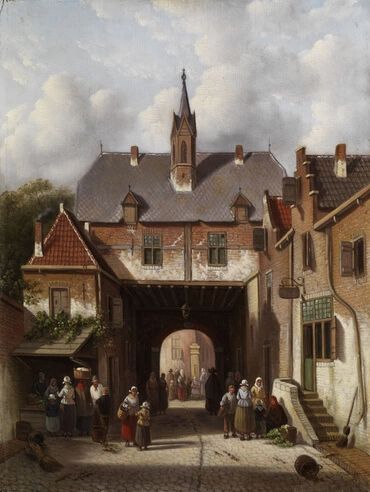Gate

Gates" in ancient times had a significance that does not hold in the modern world. Cities then were enclosed by walls for protection; gates in the walls let people in and out to do their business, but were also the weak points in the cities' defenses. In the Bible, cities on one level represent the minds of individual people. On a broader level, they represent beliefs shared by a community. The gates, then, represent openings where the Lord can feed us an understanding of truth and a desire for good. They also represent points where the hells can invade and sway us with false ideas and evil desires. We are kept in balance during our lifetimes, with influences from both the Lord and from hell. Ideally, we will over our lifetimes continue to invite the Lord farther and farther in and drive the hells back until ultimately the Lord can occupy our minds completely. And that point our belief in Him and His power and love will hold the gates and deny evil any entrance. As individuals, we at that point become angels. As communities, we at that point become part of the Lord's church. And at that point the gates become an entry point, introductory truths that allow people to enter churches and start bringing the Lord into their lives.
Arcana Coelestia # 3833
3833. 'And so it was in the evening' means when the state was still obscure. This is clear from the meaning of 'the evening' as an obscure state, dealt with in 3056. Furthermore feasts held in the evening, that is, suppers, meant nothing else among the ancients who had appropriate religious observances than the introductory state which comes before an actual joining together, which is obscure compared with that state when the joining together has taken place. Indeed when a person is being introduced into truth and from this into good, everything he learns at that time is obscure. But once good is joined to him and he regards truth from the standpoint of good, everything he learns becomes clear to him, gradually and increasingly so. For he is now no longer in doubt about whether something exists or whether it is true but knows that it exists and is true.
[2] Once a person has reached this state he starts to know countless things, for he now proceeds from the good and truth which he believes and perceives. He proceeds so to speak from the central point out to the peripheral regions; and in the measure that he proceeds from such good and truth, he sees in the same measure the things round about, and gradually more and more widely since he is constantly pushing out and extending the boundaries. Thereafter he also begins from each subject situated in the space within those boundaries, and from those subjects as new centres he pushes out new peripheral regions; and so on in the spaces within these. Consequently the light of truth radiating from good increases enormously and becomes one expanse of light, for he is now bathed in the light of heaven which shines from the Lord. But to people who are prone to doubt and who question whether something exists and is true, those countless, indeed limitless things are not visible at all. To them every single one is totally obscure. Those things are scarcely seen by them as a single whole which definitely exists, only as a single whole whose very existence they are uncertain of. Such is the condition into which human wisdom and intelligence has fallen at the present day. Being able to reason cleverly whether something exists is now the mark of a wise man, and being able to reason that it does not exist is the mark of one wiser still.
[3] Take for example the question whether in the Word an internal sense exists which such people call the mystical sense. Until they believe in the existence of it they cannot know a single one of the countless things existing within that sense, so many that they fill the whole of heaven in unending variety. Take as another example one who reasons about whether Divine Providence is merely universal and does not extend to specific details. That person cannot know the countless arcana which have to do with Providence, as many in number as the occurrences in everyone's life from start to finish and in the world from its creation to its end, and even for ever. Take as yet another example one who reasons whether good can exist in anyone, seeing that the will of man is fundamentally depraved. He cannot possibly be aware of all the arcana that have to do with regeneration, nor even that a new will is implanted by the Lord and the arcana concerning this. And the same is so with everything else. From this one may recognize what obscurity surrounds such people and that they do not even see, let alone reach, the outskirts of wisdom.






